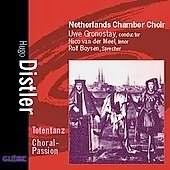Thorofon CTH 2403 (1999)
Distler: Chamber Concerto for Harpsichord & 11 Instruments
Concerto for Harpsichord & Strings Op. 14
Concerto for Harpsichord & Strings Op. 14
Martin Haselböck/Vienna Academy
Distler: Concerto for Harpsichord & Strings Op. 14
Huguette
Dreyfus (harpsichord)/Martin Stephani/Deutsche Bachsoloisten
Schauspielmusik from Der Ritter Blaubart
Katharina
Wingen (soprano)/Stefan Livland (tenor)/Stefan Malzew/Neubrandenburger
Philharmonie
The
revival of interest in the harpsichord in the early decades of the 20th
century, spearheaded by such charismatic interpreters as Wanda Landawska and Violet Gordon-Woodhouse,
inspired a number of contemporary composers to write new works for the
instrument. A handful of these are still performed on a regular basis today, most
notably Francis Poulenc's Concert
champetre, Frank Martin's Petite
Symphonie Concertante, Bohuslav Martinu's blithely neo-classical Harpsichord Concerto, and the chamber-intimate Concerto for Harpsichord by Manuel de Falla. Any consideration of
Distler's concerted works for haprischord must be placed into this historical context. Long before the "original instruments" revolution of the 1960s, all these composers conceived their works for large, multi-manual, grand-piano-like instruments by Pleyel, Neuport and other manufacuters.
Distler's fascinating Chamber Concerto for Harpsichord & 11 Instruments (1930-'32) suggests the influence of Hindemith's Kammermusiken both in scale and style, though the piece had to wait until 1998 for its premiere-- this superb recording from Thorofon made within days of that initial performance. Employing an authentic 1930s-era Neuport instrument similar to the one Distler owned, this reading is refreshingly free of the balance issues that vex so many other recordings of the modern harpsichord repertory, in which, all too often, the anachronistically "Baroque-authentic" keyboard is overpowered by the ensemble. The music displays great affective depth and emotional complexity, a searing, searching quality in its uncharacteristically acerbic dissonances. This is music of a deeply personal nature, movingly original notwithstanding its obvious influences.
Hugo Distler (1908-1942) is probably best known for his sacred choral and organ music, most of it based on old Reformation-era chorales and texts. Many of these works are undoubted masterpieces, and the Choral Passion Op. 7, Weinachtsgeschicte (Christmas Story) Op. 8, and Totentanz (Dance of Death) from Op. 12, along with the lovely, often strikingly intense settings of Möricke poems have justifiably gained a foothold in the modern choral repertory. His organ works are often featured in recitals, though perhaps not with as much frequency as their quality would suggest they deserve.
The Concerto for Harpsichord & Strings Op. 14 was written between 1935 and '36, when the composer was in his late 20s. Originally in four movements, the work is most often heard today in a rather thoughtlessly redacted three-movement version (the composer's peevish response to initial criticism of the work's length). The Haselböck reading on Thorofon has restored the original third Allegro spirituoso e scherzando movement with illuminating results, revealing for the first time a work of extraordinary maturity and expressive power, so far removed from the vaguely bijou impression left by so many previous "incomplete" performances. (Distler himself described the music as "angry".) Thorofon's recording venue is sufficiently natural, with an almost perfectly balanced ensemble, affording the work what is probably the most convincing, powerfully moving reading it has ever received.
By contrast, Huguette Dreyfus' muddled, cursory rendition for the Musicaphon label gives the impression of music that doesn't seem to go anywhere. Hearing this, one might imagine a composer struggling with an unfamiliar form, guilty of mindless "note-spinning", endeavoring to eke out some type of structure from woefully inadequate thematic materials. The slow Hindemithian second movement seems dismally ponderous and uninspired here. Without the original third movement, the theme-and-variations finale makes for a jarring contrast, and little sense, seeming hardly more than a quaint addendum, or, worse, an eclectic aftethought. While the Berlin Bach Soloists' playing is sufficiently energetic, the recording might well have benefitted from a drier, less resonant acoustic, as the strings constantly seem to be getting lost in a deep echo chamber, rendering moments of the piece virtually incoherent. I was reminded of those early mono LPs that were incompetently "electronically rechanneled to simulate stereo". Overall, quite a disappointment, especially as Musicaphon advertises the recording as a super-audo production. The live performance of Distler's incidental music for Der Ritter Blaubart (The Knight Bluebeard), a play by Ludwig Tiek, is interesting for sharing some of the thematic material from the the harpsichord concerto, and may well be the best reason to get the Musicaphon disc. Performances are quite good, with a better acoustic ambiance than the concerto, and the recorded sound is excellent.
Globe GLO
5175 (1998)*
Distler: Choral-Passion Op. 7
Totentanz Op. 12, No. 2
(The
Dance of Death)
Uwe
Gronostay/Netherlands Chamber Choir
Thorofon
CTH 2281 (1997)*
Distler: Die Wienachtsgeschichte Op. 10
(The
Christmas Story)
Liedmotetten zu Weinachts (8)
(Motets
based on Christmas Carols)
Christian
Grube/Chamber Choir of the Hochschule der Künste, Berlin
Berlin
Classics 3288 (2005) *
Berlin
Classics 9246 (MP3) (2006)
Brilliant
Classics 94695 (CD) (2012 re-issue)
Distler: Die Wienachtsgeschichte Op. 10
(The
Christmas Story)
Hans-Joachim
Rotzsch/Choir of St. Thomas Church Leipzig
Rondeau
Productions 6068 (2012)*
Hugo Distler (1908-1942)
Selections
from Der Jahrkreis Op. 5
Totentanz Op. 12, No. 2;
Motets from Op. 12
Sjaella/Ensemble
Nobiles
Cantate C
57007 (1994)*
Geistliche Chormusik
(Sacred
Choral Music)
Distler: Motets from Op. 12
Totentanz Op. 12, No. 2
Bernd
Stegmann/Berlin Vokalensemble
LP:
Koch/Schwann 117 008 FA (1988)
CD
Koch/Schwann 317 008 H1 (1988)
Distler: Totentanz Op. 12, No. 2
Bruckner:
5 Motets
Herbert Böck/Concentus
Vocalis
Musicaphon
M 51820 (1993)*
Thorofon
2231 (1994 re-issue)
Distler: Möricke-Chorliederbuch Op. 19
Bernd
Stegmann/Berlin Vokalensemble
Thorofon
CTH 2420 (2001)
Distler: Liturgische Sätze
(Liturgical
Pieces)
(selections from Op. 5, 6, 11, and 13)
(selections from Op. 5, 6, 11, and 13)
Wolfgang
Unger/Leipzig University Choir et al.
Thorofon CTH
2293 (1997) (Vol. 1)
Thorofon
CTH 2294 (1997) (Vol. 2)
Distler: Das Orgelwerke
(Organ
Works)











No comments:
Post a Comment